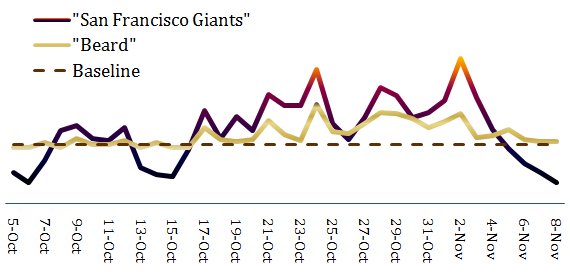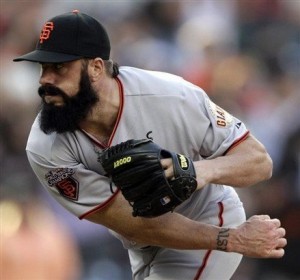
Google Trends for "San Francisco Giants" and "Beard" in 2010, log scale. The two orange peaks are San Francisco qualifying for and winning the World Series.
On October 24, 2010 “beard” suddenly more than doubled in Google Trends popularity, after maintaining a relatively stable prior baseline. There are probably a billion or so beards in the world but this was due to just one, belonging to the SF Giant’s closer Brian Wilson.
If you don’t follow baseball, a closer is the closing pitcher who rarely comes in until the last (9th) innings and even then not in every game. Yet despite his limited field time and the fact that having a beard is not particularly odd, this one beard pretty much dominated the trending of the term leading up to and during the world series (see graph). As for exactly why this coal-miner-like beard grabbed everyone’s attention? Your guess is as good as mine. But it highlights nicely that a change in language does not necessarily map directly to a change in culture: the increase in global beards in October 2010 was infinitesimal while the increase in online reporting and discussion more than doubled.
In this case, the graph makes it easy to see the correlation. The tricky part of linguistics is when the external evidence is not so easy to identify – how easy would it be to mistakenly see the “beard” graph alone, and infer some greater cultural significance in ignorance of the actual factors? We simply can’t count the frequency of word usages in isolation and directly infer the nature of any cultural trends as one real-world instance among millions can easily carry half weight of all reported instances.Of course, the discussion alone can spark the trend if not reflect it. I know one prominent bay-area computational linguist conspiring to grow a beard and I first thought to look at the trends after noticing so many at a game last week. But this post isn’t about beards, it’s about language and you could probably argue that the trend does reflect a cultural trend. It’s just that it is a trend of celebrity rather than social change.
Rob
